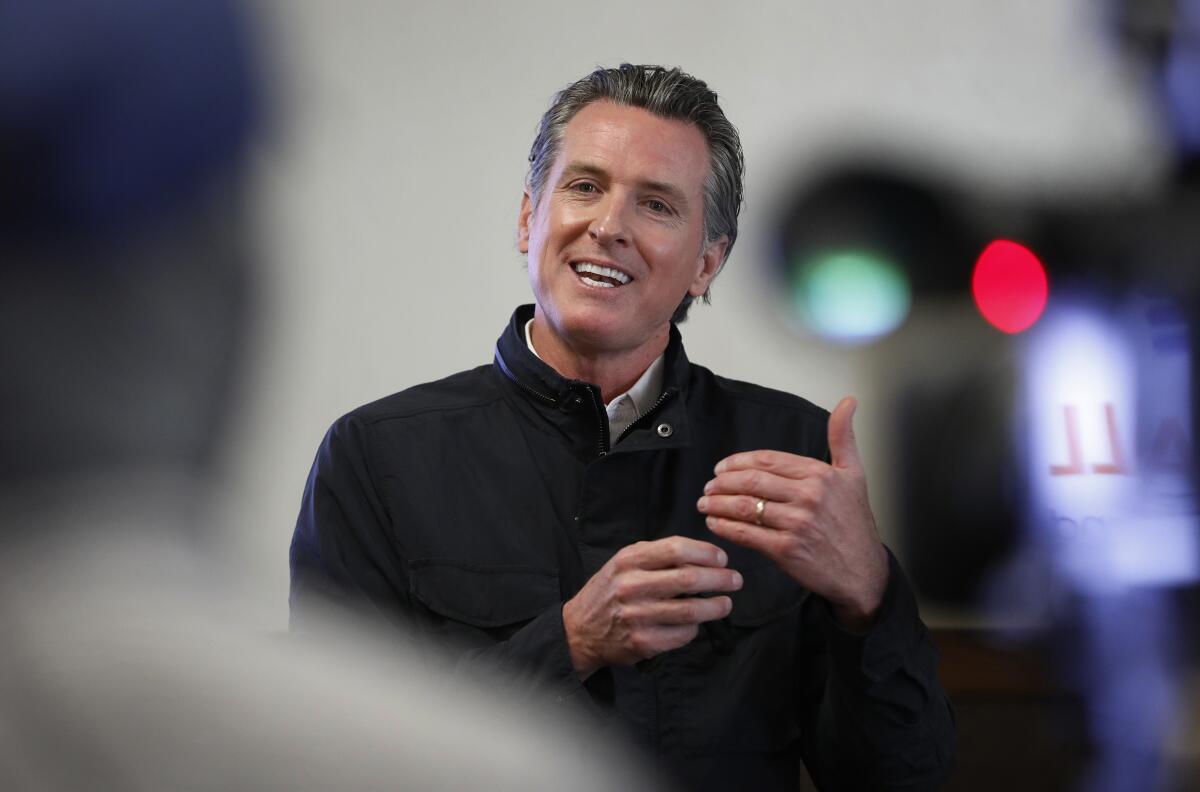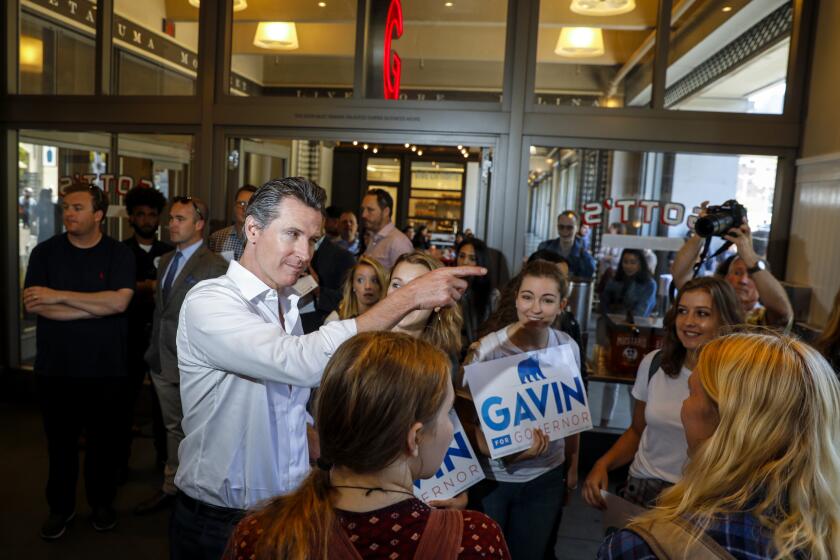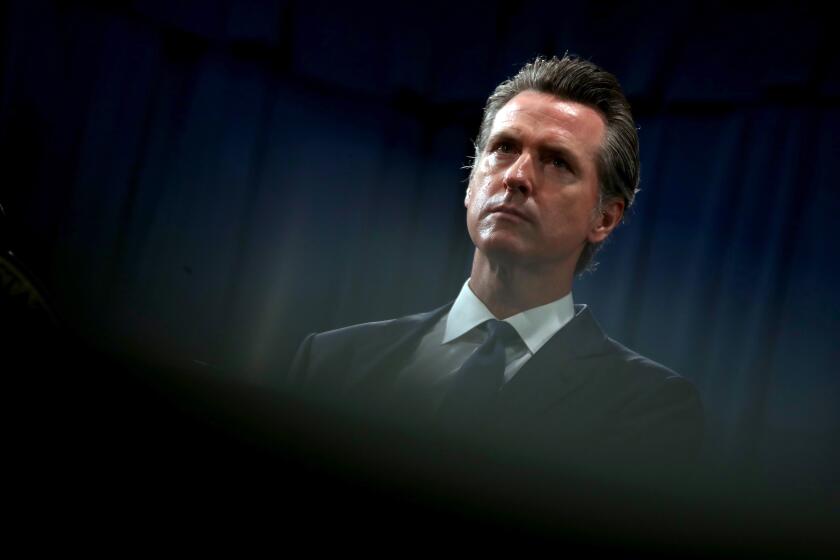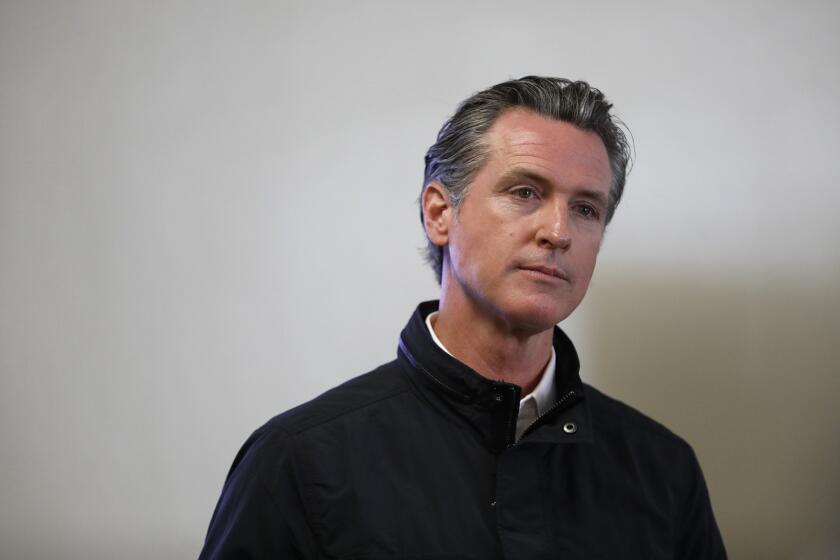Newsom won’t ‘take this recall attempt lying down’ as Democrats launch defense

- Share via
SACRAMENTO — Gov. Gavin Newsom lashed out Monday at the effort by critics to remove him from office, calling it a “Republican recall” fueled by backers of former President Trump and warning that it could stymie California’s efforts to respond to the pandemic.
A coalition of national Democratic leaders also spoke out against the recall, and the state party promised $250,000 for a campaign to defend Newsom, a coordinated effort that may signal a concession that the governor’s opponents have collected enough voter signatures to force a special election later this year.
“I am not going to take this recall attempt lying down,” Newsom said in an email sent from his political campaign. “I’m going to fight because there’s too much at stake in this moment.”
Wednesday is the deadline for recall supporters to submit all voter-signed petitions to elections offices in California’s 58 counties. Last week, supporters said they had gathered some 2 million signatures, more than the roughly 1.5 million needed to trigger a recall election. Elections officials have until April 29 to complete their review of the signatures to determine how many are valid.
Newsom had largely refused to comment on the recall until Monday, insisting he was focused only on his administration’s efforts to reduce the spread of the coronavirus and to ensure millions of Californians receive the COVID-19 vaccine. Friday will mark the first anniversary of his sweeping stay-at-home order in response to the outbreak of the pandemic.
In an interview with KQED Public Media last week, Newsom pointed out that the recall petition was filed before the current public health crisis and that its proponents cited opposition to his pro-immigrant, pro-environmental-protection policies.
Gavin Newsom has faced a backlash against COVID closures and their effects on the economy, fueling a recall effort led by Republican activists.
If successful, the petition drive will lead to only the second gubernatorial recall election held in California and only the fourth in U.S. history. Voters would consider a two-part ballot, asking them first whether to remove Newsom from office and then to choose among a list of candidates to replace him should the recall pass.
A group of prominent national Democrats, including Sens. Elizabeth Warren of Massachusetts and Cory Booker of New Jersey, and independent Sen. Bernie Sanders of Vermont, announced their opposition to the recall Monday. They were joined by two California lawmakers, Sen. Alex Padilla of Los Angeles and Rep. Katie Porter of Irvine. Stacey Abrams, a prominent Democratic organizer who ran for governor of Georgia in 2018, also voiced her support for Newsom in a news release from a new anti-recall political campaign.
“Gavin Newsom has shown the nation what courageous leadership looks like during the pandemic,” Booker said in a written statement. “Defeating this cynical, Republican recall effort will be one of the most important priorities for Democrats this year.”
The attempted recall of Gov. Gavin Newsom will go before voters on Sept. 14. Here are the details.
The recall campaign has received most of its backing from Republicans and is supported by state GOP officials. Earlier this month, its proponents insisted that almost one-third of the voters who signed the petitions were not Republicans. But polling has shown it to be far more popular among GOP voters than among Democrats or unaffiliated voters.
A poll released Monday by Emerson College found just 38% of voters surveyed said they would vote to remove Newsom if a recall election was held. Forty-two percent said they would vote to keep Newsom in office, with the remainder of voters surveyed either unsure or saying they wouldn’t vote in a recall election.
Newsom’s supporters also released a new campaign ad Monday highlighting that some recall supporters had also helped spread conspiracy theories related to the November presidential election and had expressed support for groups such as QAnon and the Proud Boys.
The governor sought to capitalize on the issue in his email on Monday to supporters.
If the recall campaign’s results hold steady from last month — when state officials reported that almost 84% of the initial signatures were valid — there would be more than enough signatures for an election that could oust Newsom.
“And let’s call it what it is: it’s a partisan, Republican recall — backed by the [Republican National Committee], anti-mask and anti-vax extremists, and pro-Trump forces who want to overturn the last election and have opposed much of what we have done to fight the pandemic,” Newsom wrote in the email.
Although no Democrats have come forward to say they would run in a recall election to replace Newsom, two prominent Republicans have announced they would seek to serve out the remainder of Newsom’s current term. Former San Diego Mayor Kevin Faulconer and 2018 gubernatorial candidate John Cox have both launched exploratory campaigns, criticizing Newsom for a lackluster record of responding to the pandemic.
Several of California’s Black congressional leaders said Monday that those criticisms aren’t a sufficient reason for a recall election.
“Mark my words, if the recall does qualify, this is just the beginning,” said Rep. Karen Bass (D-Los Angeles). “We will crush it, because we will be united that we are not going to fall for a trick to hand our state over to what potentially could be a Republican governor.”
The Emerson College poll showed Newsom could struggle to win a second term if political conditions didn’t change. While 57% of California voters surveyed said they thought the state was headed in the right direction, 58% said they believed the state needed a new governor at the next scheduled election in 2022.
Times staff writer Seema Mehta contributed to this story
More to Read
Sign up for Essential California
The most important California stories and recommendations in your inbox every morning.
You may occasionally receive promotional content from the Los Angeles Times.














